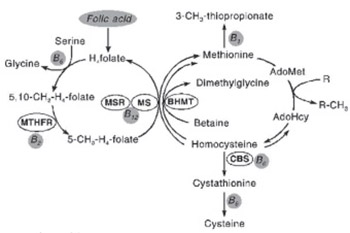Polymorphism in Methylentetrahydrofolate Reductase Gene: Important Role in Diseases
DOI:
https://doi.org/10.17305/bjbms.2008.2975Keywords:
MTHFR, Homocysteine, polymorphism diseasesAbstract
It has been recognized that some people have a genetic variant which leads to elevated levels of homocysteine and impairs ability to process folate. This condition was recognized as independent risk factor of coronary heart disease. Recently, connection between this termolabile mutation of the methylenetetrahydrofolate reductase and numerous conditions and diseases has been established. Aim of this review is to draw attention to this interesting area in medicine. Additionally, well defined study about presence and frequency of gene polymorphism in our region will provide proper diagnosis and achieve possible delay of development of diseases with vitamin supplementation.
Citations
Downloads

Published
How to Cite
Accepted 2018-01-14
Published 2008-05-20









